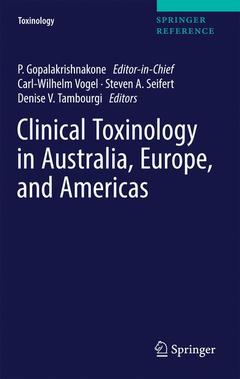Description
Clinical Toxinology in Australia, Europe, and Americas, 1st ed. 2018
Toxinology Series
Language: English
Subject for Clinical Toxinology in Australia, Europe, and Americas:
Keywords
Support: Print on demand
Description
/li>Contents
/li>Biography
/li>Comment
/li>
This handbook addresses various topics on clinical toxinology such as the epidemiology and management of snake and insect bites in Australia and different countries in Europe and the Americas. Chapters will be written by experts currently working in the subspecialty, many of whom have ?rst-hand experience in the relevant research ?elds. In virtually all the topics, appropriate illustrations are provided to simplify comprehension including tables, ?gures and pictures.
Clinical toxinologic conditions are becoming increasingly frequent, more so than is generally recognized. The conditions comprise of clinical aspects such as the diagnosis, management, and prevention of snakebite envenoming, scorpion sting, mushroom toxins, plant toxins, and other natural toxins. Clinical toxinology also deals with the ecology, epidemiology, regional differences, and varieties of fauna accounting for different envenoming manifestations.
This reference work, part of the Toxinology handbook series, is designed to keep readers abreast with new knowledge and experience in toxinology regionally and globally. Toxinologists, researchers, scientists, and experts in this ?eld from various working areas considered it necessary to collect all the aspects of clinical toxinology in a single, handy handbook. This can be used by medical students, postgraduate students, general practitioners, specialists in internal medicine, critical care physicians, emergency physicians, and anesthetists worldwide.
Comprehensive and current information for toxinologists of all kinds
Covers diagnosis and treatment but also epidemiology and regional differences
Supports readers with helpful illustrations
Includes supplementary material: sn.pub/extras
These books may interest you

Scorpion Venoms 488.00 €



